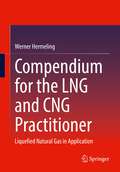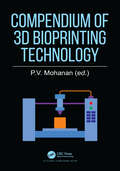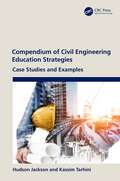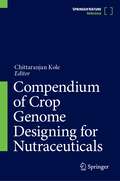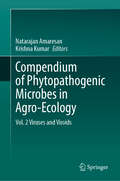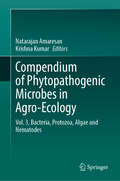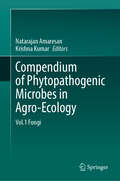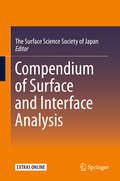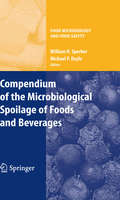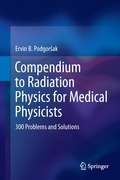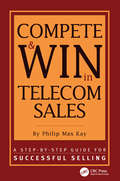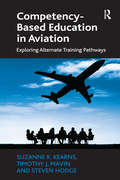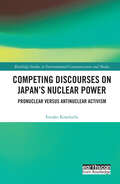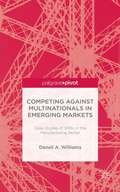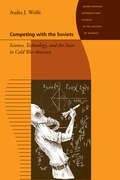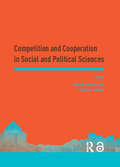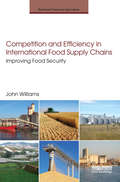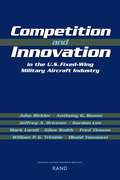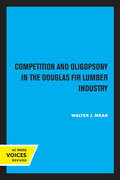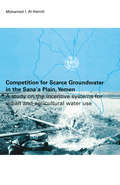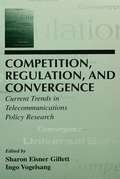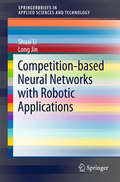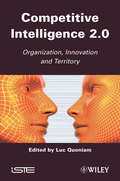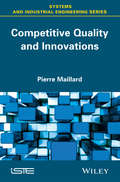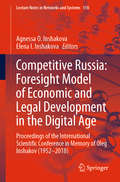- Table View
- List View
Compendium for the LNG and CNG Practitioner: Liquefied Natural Gas in Application
by Werner HermelingThe most important physical principles as well as the engineering equipment (components, assemblies as well as their function) for the regasification and compression of cryogenic liquefied gases (incl. biogas / methane from recent sources) are presented in this book. Practical advice is given on possible plant layout and design. Safety-related as well as product-specific designs are pointed out and their solutions are described. The book contains numerous references and summaries. The author is an engineer of chemical plant engineering as well as heat, ventilation and air conditioning technology with many years of practical experience in the field of cryogenic liquefied gases, their transport, regasification and compression. He is the inventor of several patented and implemented solutions. This book is addressed to safety officers, plant operators, employees in direct contact with such plants as well as decision makers and approving authorities.
Compendium of 3D Bioprinting Technology
by P. V. Mohanan3D bioprinting is an emerging innovative technology that involves the fabrication of essential 3D functional biomedical constructs by combining cells and biomaterials with vital growth and differentiation factors. It aims to replicate the natural tissue milieu and holds great promise in fields like tissue engineering, regenerative medicine, drug development and testing, precision medicine, etc. 3D bioprinted disease-specific models help to study, screen the treatment methods and understand the mechanism of action. In personalized medicine, patient-specific tissue and organ constructs can be developed for specific surgeries and treatments tailored to a patient’s unique anatomy and genetics. 3D functional tissue construct addresses the problem of organ shortage as it lowers the risk of rejection of tissues and organs. The technique also replaces the need to experiment on animals and improves the accuracy of pre-clinical studies to test the safety and efficacy of new drugs in bioprinted tissues.This book provides comprehensive coverage of the application of 3D bioprinting technology. It is a collection of contributions by experts with cutting-edge know-how. The book is meant for medical practitioners, pharma companies, CROs, product developers, students, researchers, academicians, policymakers and practitioners.
Compendium of Civil Engineering Education Strategies: Case Studies and Examples
by Hudson Jackson Kassim TarhiniThis book compiles the latest strategies and information regarding civil engineering education, and the skills necessary for success that are tangential to engineering, including global perspectives, critical and design thinking skills, leadership skills, assessment, recruitment, retention, and more. It is designed so that each chapter can be used separately or in combination with other chapters to help enhance and foster student learning as well as promote the development of skills required for engineering practice. Features Includes overviews of successful academic approaches for each topic including implementation examples in every chapter Explains how assessment and the resulting data can be used for holistic evaluation and improvement of student learning Addresses the complexities of moral and professional ethics in engineering Highlights the importance of adopting a global perspective and the successful strategies that have been used or considered in educating resilient, globally minded engineers Compendium of Civil Engineering Education Strategies: Case Studies and Examples serves as a useful guide for engineering faculty, practitioners, and graduate students considering a career in academia. Academic faculty and working professionals will find the content helpful as instructional and reference material in developing and assessing career skills. It is also useful for intellectually curious students who want a deeper understanding and appreciation of the need for professional development and life-long learning.
Compendium of Crop Genome Designing for Nutraceuticals
by Chittaranjan KoleThe crop plants cater not only to our basic F5 (food, feed, fiber, fuel, and furniture) needs but also provide a number of nutraceuticals with potential nutritional, safety and therapeutic properties. Many crop plants provide an array of minerals, vitamins, and antioxidant-rich bioactive phytochemicals. Increasing incidences of chronic diseases such as cancer, diabetes and HIV, and malnutrition necessitate global attention to health and nutrition security with equal emphasis to food security. This compendium compiles results of researches on biochemical, physiological and genetic mechanisms underlying biosynthesis of the health and nutrition related nutraceuticals. It also explores the precise breeding strategies for augmentation of their content and amelioration of their quality in crop plants under all commodity categories including cereals and millets, oilseeds, pulses, fruits and nuts, and vegetables. The compendium comprise 5 sections dedicated to these 5 commodity groups and presents enumeration on the concepts, strategies, tools and techniques of nutraceutomics. These sections include 50 chapters devoted to even number of major crop plants. These chapters present deliberations on the biochemistry and medicinal properties of the nutracuticals contained; genetic variation in their contents; classical genetics and breeding for their quantitative and qualitative improvement; tissue culture and genetic engineering for augmentation of productivity and quality; and sources of genes underlying their biosynthesis. They also include comprehensive enumeration on genetic mapping of the genes and QTLs controlling the contents and profile of the nutraceuticals and molecular breeding for their further improvement through marker assisted selection and backcross breeding tools. Prospects of post-genomic precise breeding strategies including genome-wide association mapping, genomic selection, allele mining, and genome editing are also discussed. This compendium fills the gap in academia, and research and development wings of the private sector industries interested in an array of subjects including genetics, genomics, tissue culture, genetic engineering, molecular breeding, genomics-assisted breeding, bioinformatics, biochemistry, physiology, pathology, entomology, pharmacognosy, IPR, etc., and will also facilitate understanding of the policy making agencies and people in the socio-economic domain and research sponsoring agencies.
Compendium of Phytopathogenic Microbes in Agro-Ecology : Vol. 2 Viruses and Viroids
by Krishna Kumar Natarajan AmaresanThis book offers an in-depth exploration of phytopathogenic viruses and viroids within the context of agroecology. Each chapter meticulously details the introduction, taxonomy, and diseases caused by these pathogens, alongside their pathogenic mechanisms, economic significance, and strategies for identification and control. By providing comprehensive insights into these topics, the book empowers researchers to manipulate these pathogens to suit their needs. The chapters investigate key concepts such as pathogen taxonomy, disease cycles, and control measures, addressing critical questions about their economic impact on crop yield. Expert contributors present a thorough analysis of 104 plant pathogens, organized into distinct microbial groups. This volume is an essential resource for understanding the complex interactions between pathogens and their host plants, offering practical solutions for disease management. This book is an invaluable resource for postgraduate students, research scholars, post-doctoral fellows, and educators across disciplines such as Plant Microbiology, Plant Pathology, Entomology, Virology, and Nematology. As the second volume in a comprehensive three-part series, it provides crucial insights into the economic importance of bacteria, fungi, viruses, viroids, and nematodes. This compendium is a must-have for anyone seeking to deepen their understanding of plant pathogens and their impact on agriculture.
Compendium of Phytopathogenic Microbes in Agro-Ecology : Vol. 3, Bacteria, Protozoa, Algae and Nematodes
by Krishna Kumar Natarajan AmaresanThis book offers an in-depth exploration of phytopathogenic bacteria, nematodes, protozoa, and algae within the context of agroecology. Each chapter meticulously details the introduction, taxonomy, and diseases caused by these pathogens, alongside their pathogenic mechanisms, economic significance, and strategies for identification and control. By providing comprehensive insights into these topics, the book empowers researchers to manipulate these pathogens to suit their needs. Key concepts covered include the economic impact of plant pathogens on yield loss, the pathogenic cycles of various microbes, and effective control measures. The book's expert contributors present a thorough analysis of 104 plant pathogens, organized into distinct microbial groups. This volume is an essential resource for understanding the complex interactions between pathogens and their host plants, offering valuable knowledge for developing sustainable agricultural practices. This book is an indispensable resource for postgraduate students, research scholars, post-doctoral fellows, and educators in fields such as Plant Microbiology, Plant Pathology, Bacteriology, Protozoology, Algology, and Nematology. As the second volume in a comprehensive three-volume compendium, it provides critical insights into the economic importance of pathogens and their role in yield loss, making it a must-have for anyone involved in plant sciences.
Compendium of Phytopathogenic Microbes in Agro-Ecology : Vol.1 Fungi
by Krishna Kumar Natarajan AmaresanThis book offers an in-depth exploration of phytopathogenic fungi within the context of agroecology, providing essential insights for understanding and managing these critical organisms. Each chapter begins with a comprehensive information panel that introduces the pathogen, detailing its taxonomy, the diseases it causes, its pathogenic mechanisms, economic significance, and strategies for identification and control. By equipping researchers with this knowledge, the book empowers them to manipulate these fungi to meet their specific needs. Key concepts covered include the taxonomy and life cycles of various fungi, the economic impact of fungal diseases on crop yield, and innovative control measures. The book's expert contributors provide a thorough analysis of each pathogen, making it an indispensable resource for anyone involved in plant health and disease management. This volume is the first in a three-part series that will cover a total of 104 plant pathogens, including bacteria, viruses, viroids, and nematodes, highlighting their economic importance in agriculture. This book is an invaluable resource for postgraduate students, research scholars, post-doctoral fellows, and educators in fields such as Plant Microbiology, Plant Pathology, Entomology, Virology, and Nematology. It is a must-read for those seeking to deepen their understanding of plant pathogens and their impact on agriculture.
Compendium of Surface and Interface Analysis
by The Surface Science Society of JapanThis book concisely illustrates the techniques of major surface analysis and their applications to a few key examples.Surfaces play crucial roles in various interfacial processes, and their electronic/geometric structures rule the physical/chemical properties. In the last several decades, various techniques for surface analysis have been developed in conjunction with advances in optics, electronics, and quantum beams. This book provides a useful resource for a wide range of scientists and engineers from students to professionals in understanding the main points of each technique, such as principles, capabilities and requirements, at a glance. It is a contemporary encyclopedia for selecting the appropriate method depending on the reader's purpose.
Compendium of the Microbiological Spoilage of Foods and Beverages (Food Microbiology and Food Safety)
by William H. Sperber Michael P. DoyleThough much of our collective knowledge on microbiological spoilage has accrued over the past century and is still valid today, there is no one place to find this information. Compendium of the Microbiological Spoilage of Foods and Beverages is the first book to collect this important information. This book is edited by William H. Sperber and Michael P. Doyle, two of the best researchers in this field.
Compendium to Radiation Physics for Medical Physicists: 300 Problems and Solutions
by Ervin B. PodgorsakThis exercise book contains 500 typical problems and exercises in modern physics and radiation physics with complete solutions, detailed equations and graphs. This textbook is linked directly with the textbook "Radiation Physics for Medical Physicists", Springer (2010) but can also be used in combination with other related textbooks. For ease of use, this textbook has exactly the same organizational layout (14 chapters, 125 sections) as the "Radiation Physics for Medical Physicists" textbook and each section is covered by at least one problem with solution given. Equations, figures and tables are cross-referenced between the two books. It is the only large compilation of textbook material and associated solved problems in medical physics, radiation physics, and biophysics.
Compete and Win in Telecom Sales: A Step-by -Step Guide for Successful Selling
by Philip Max KayFor anyone ready to launch a successful career in sales for telecom equipment, services and technologies, or for veterans ready to break through to a higher level, this book provides a practical eight-step program for successful selling.
Competency-Based Education in Aviation: Exploring Alternate Training Pathways
by Steven Hodge Suzanne K. Kearns Timothy J. MavinWhether a trainee is studying air traffic control, piloting, maintenance engineering, or cabin crew, they must complete a set number of training 'hours' before being licensed or certified. The aviation industry is moving away from an hours-based to a competency-based training system. Within this approach, training is complete when a learner can demonstrate competent performance. Training based on competency is an increasingly popular approach in aviation. It allows for an alternate means of compliance with international regulations - which can result in shorter and more efficient training programs. However there are also challenges with a competency-based approach. The definition of competency-based education can be confusing, training can be reductionist and artificially simplistic, professional interpretation of written competencies can vary between individuals, and this approach can have a high administrative and regulatory burden. Competency-Based Education in Aviation: Exploring Alternate Training Pathways explores this approach to training in great detail, considering the four aviation professional groups of air traffic control, pilots, maintenance engineers, and cabin crew. Aviation training experts were interviewed and have contributed professional insights along with personal stories and anecdotes associated with competency-based approaches in their fields. Research-based and practical strategies for the effective creation, delivery, and assessment of competency-based education are described in detail.
Competing Discourses on Japan’s Nuclear Power: Pronuclear versus Antinuclear Activism (Routledge Studies in Environmental Communication and Media)
by Etsuko KinefuchiThis book examines the discursive formation of nuclear power in Japan to provide insights into the ways this technology has been both promoted and resisted, constituting and being constituted by Japan’s sociocultural landscape. Each chapter pays close attention to a particular discursive site, including newspaper editorials, public relations campaigns, local site fights, urban antinuclear activism, and post-Fukushima pronuclear and antinuclear articulations. The book also raises the question of democracy and sustainability through the examination of nuclear power discourses. It demonstrates the power of discourse in shaping nuclear power by creating knowledge, influencing decisions, relationships, identity, and community. Readers will gain a range of insights from the book: prominent articulations on nuclear power discourse, state and corporate strategies for enticing consent for controversial facilities and technologies, the power of the media in framing public knowledge, the role of social movements and activisms in civic society, the power of community, and nuclear power as a problematic in representative democracy and sustainability. This book will appeal to students and scholars interested in social discourse, social movements, Japanese society, cultural studies, environmental communication, media analysis, energy and sustainability, and democracy, among others.
Competing against Multinationals in Emerging Markets: Case Studies of SMEs in the Manufacturing Sector
by Densil A. WilliamsCompeting against Multinationals in Emerging Markets provides a comprehensive set of lessons which successful small firms have adopted in order to survive and prosper in an increasingly hostile competitive manufacturing sector where large firms are mostly dominant.
Competing with the Soviets: Science, Technology, and the State in Cold War America (Johns Hopkins Introductory Studies in the History of Science)
by Audra J. WolfeA synthetic account of how science became a central weapon in the ideological Cold War.Honorable Mention for the Forum for the History of Science in America Book Prize of the Forum for the History of Science in AmericaFor most of the second half of the twentieth century, the United States and its allies competed with a hostile Soviet Union in almost every way imaginable except open military engagement. The Cold War placed two opposite conceptions of the good society before the uncommitted world and history itself, and science figured prominently in the picture. Competing with the Soviets offers a short, accessible introduction to the special role that science and technology played in maintaining state power during the Cold War, from the atomic bomb to the Human Genome Project.The high-tech machinery of nuclear physics and the space race are at the center of this story, but Audra J. Wolfe also examines the surrogate battlefield of scientific achievement in such diverse fields as urban planning, biology, and economics; explains how defense-driven federal investments created vast laboratories and research programs; and shows how unfamiliar worries about national security and corrosive questions of loyalty crept into the supposedly objective scholarly enterprise.Based on the assumption that scientists are participants in the culture in which they live, Competing with the Soviets looks beyond the debate about whether military influence distorted science in the Cold War. Scientists’ choices and opportunities have always been shaped by the ideological assumptions, political mandates, and social mores of their times. The idea that American science ever operated in a free zone outside of politics is, Wolfe argues, itself a legacy of the ideological Cold War that held up American science, and scientists, as beacons of freedom in contrast to their peers in the Soviet Union. Arranged chronologically and thematically, the book highlights how ideas about the appropriate relationships among science, scientists, and the state changed over time.
Competition and Cooperation in Social and Political Sciences: Proceedings of the Asia-Pacific Research in Social Sciences and Humanities, Depok, Indonesia, November 7-9, 2016: Topics in Social and Political Sciences
by Isbandi Rukminto Adi Rochman AchwanThe book contains essays on current issues in Social and Political Sciences, such as the issues of governance and social order; social development and community development; global challenges and inequality; civil society and social movement; IT-based community and social transformation; poverty alleviation and corporate social responsibility; and gender issues. Asia and the Pacifi c are the particular regions that the conference focuses on as they have become new centers of social and political development. Therefore, this book covers areas that have been traditionally known as the social and political areas such as communication studies, political studies, governance studies, criminology, sociology, social welfare, anthropology and international relations.
Competition and Efficiency in International Food Supply Chains: Improving Food Security (Earthscan Food and Agriculture)
by John WilliamsWhy have food crises seemingly become more frequent in recent years, compared to the last few decades? This book examines an array of different issues and distortions that are causing food supply chain dysfunction in many countries, particularly for staple non-perishable foods such as grains, oilseeds, pulses and sugar. It outlines the underlying changes that are currently occurring, which will have an influence on the direction of future food supply chains, and provides some solutions to current food security problems. Based on an analysis of total regulation in the 1950s-60s through to deregulation during the 1980-90s, as well as post-deregulation, it focuses on liberal trade and deregulation as a more successful solution to creating efficiencies in food supply chains and distribution. The author highlights a common thread of either farmers using government for vested-interest intervention, or autocratic governments seeking market and supply-chain power. The book examines the role of government after 70 years of food supply chain intervention. It discusses the role of commercial ‘trade’ markets and cluster industries and how these can quickly disintegrate when price distortions occur. The author studies both food importing and exporting countries and concludes that comingled commoditization of food has led to increased hoarding, corruption, and dependence on food aid. He argues that a competitive food supply chain that has minimum intervention is more likely to provide future food security. In conclusion the book emphasizes that adequate rewards, competition, and striving for supply chain efficiencies are the essences of sustainable food security.
Competition and Innovation in the U.S. Fixed-Wing Military Aircraft Industry
by Mark A. Lorell Gordon T. Lee Jeffrey A. Drezner John Birkler Anthony G. BowerAssess prospects for innovation and competition in the military combat-aircraft industry.
Competition and Oligopsony in the Douglas Fir Lumber Industry
by Walter J. MeadThis title is part of UC Press's Voices Revived program, which commemorates University of California Press’s mission to seek out and cultivate the brightest minds and give them voice, reach, and impact. Drawing on a backlist dating to 1893, Voices Revived makes high-quality, peer-reviewed scholarship accessible once again using print-on-demand technology. This title was originally published in 1966.
Competition for Scarce Groundwater in the Sana'a Plain, Yemen. A study of the incentive systems for urban and agricultural water use.
by Mohammed I. Al-HamdiThe efficient management of water supply becomes even more important in arid areas where supply is at best erratic. This book looks at a range of issues connected to urban and agricultural water use in the Sana'a Plain area, including engineering and logisical problems, environmental and climatic influences on groundwater, legal and political wrangles, economic considerations and options for waste water re-use.
Competition, Regulation, and Convergence: Current Trends in Telecommunications Policy Research (LEA Telecommunications Series)
by Ingo Vogelsang Sharon Eisner GillettThe telecommunications industry has experienced dynamic changes over the past several years, and those exciting events and developments are reflected in the chapters of this volume. The Telecommunications Policy Research Conference (TPRC) holds an unrivaled place at the center of national public policy discourse on issues in communications and information. TPRC is one of the few places where multidisciplinary discussions take place as the norm. The papers collected here represent the current state of research in telecommunication policy, and are organized around four topics: competition, regulation, universal service, and convergence. The contentious competition issues include bundling as a strategy in software competition, combination bidding in spectrum auctions, and anticompetitive behavior in the Internet. Regulation takes up telephone number portability, decentralized regulatory decision making versus central regulatory authority, data protection, restrictions to the flow of information over the Internet, and failed Global Information Infrastructure initiatives. Universal service addresses the persistent gap in telecommunications from a socioeconomic perspective, the availability of competitive Internet access service and cost modeling. The convergence section concentrates on the costs of Internet telephony versus circuit switched telephony, the intertwined evolution of new services, new technologies, and new consumer equipment, and the politically charged question of asymmetric regulation of Internet telephony and conventional telephone service.
Competition-Based Neural Networks with Robotic Applications (SpringerBriefs in Applied Sciences and Technology)
by Shuai Li Long JinFocused on solving competition-based problems, this book designs, proposes, develops, analyzes and simulates various neural network models depicted in centralized and distributed manners. Specifically, it defines four different classes of centralized models for investigating the resultant competition in a group of multiple agents. With regard to distributed competition with limited communication among agents, the book presents the first distributed WTA (Winners Take All) protocol, which it subsequently extends to the distributed coordination control of multiple robots. Illustrations, tables, and various simulative examples, as well as a healthy mix of plain and professional language, are used to explain the concepts and complex principles involved. Thus, the book provides readers in neurocomputing and robotics with a deeper understanding of the neural network approach to competition-based problem-solving, offers them an accessible introduction to modeling technology and the distributed coordination control of redundant robots, and equips them to use these technologies and approaches to solve concrete scientific and engineering problems.
Competitive Inteligence 2.0: Organization, Innovation and Territory
by Luc QuoniamThe recent “concept of 2.0", a consequence of "Web 2.0", discusses the emergence of a new style, emancipated from the Web, which finds applications in all areas of social activity: management, innovation, education , organization, territory, etc. This book considers the implications of the changing paradigm for competitive, economic and territorial intelligence applied to innovation, value creation and enhancement of territories. Competitive intelligence is therefore in the "2.0" and its values: perpetual beta, user-generated content, social relations, etc., horizontality, a renewed legitimacy. This book, collecting contributions from international experts, testifies to the heterogeneity and richness of possible approaches. It provides a totally new way of evaluating the impact of 2.0 with concrete examples, while analyzing the theoretical models allowing the reader to develop in other contexts the described cases of success.
Competitive Quality and Innovation
by Pierre MaillardAll industrialized countries are stepping up efforts to revive economic activity through innovation. They use innovation to find solutions to the problems of the Company, and to operate as soon as possible the results of scientific research which represent an important source of competitive growth. The fundamental problems of our Company is focused on environmental protection, energy saving and searching for better use of renewable energy, recycling of raw materials, management of migration caused by social imbalances -economic and performance information and transportation, the growth of the human population, and the aging of the population means. For example, without therapeutic innovations life of the human being would not be much longer. Without technological innovation, transportation would not have been as reliable, fast and comfortable. Without technological innovation, the number and diversity of products would not have reached its current level. Innovation accelerates change and we use innovation to control the acceleration or use it. But, against paradoxically destabilizing innovation and the consumer gets used and often expected innovation. There is less and less attracted by innovation, and must fit into systems increasingly complex. The risks of failure are therefore increasingly large. The finding of this new economic dynamic, highlights the need to introduce quality initiatives in the innovation process to increase the chances of success for companies that want to grow through innovation. This book presents the key benchmarks that characterize these new practices of quality in the processes of innovation.
Competitive Russia: Proceedings of the International Scientific Conference in Memory of Oleg Inshakov (1952-2018) (Lecture Notes in Networks and Systems #110)
by Agnessa O. Inshakova Elena I. InshakovaThis proceedings book presents papers from the 18th International Scientific Conference, held in September 2019 at Volgograd State University (Russia). The research findings are largely based on the theoretical assumptions of Oleg Inshakov, renowned for his pioneering work on the theory of economic genetics and the theory of “development nucleus” for economic systems.The papers focus on the impact of the 4th industrial revolution on economic growth, the concept of ecosystems corresponding to the rapid spread of digital technologies, regulatory and legal aspects of the Russian economy digitalization, the development of digital technologies in EAEU and BRICS foreign trade, and the corresponding law enforcement measures.The book is intended for academics and practitioners, as well as anyone interested in the problems of new industrialization and the digital transformation of the economy of business entities, regions, countries and integration unions, and their legal regulation to enhance competitiveness on a national and global scale
